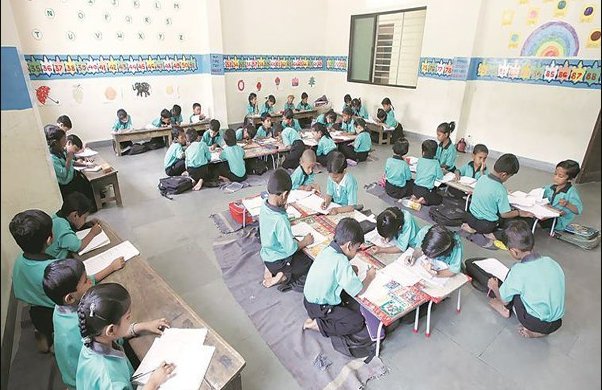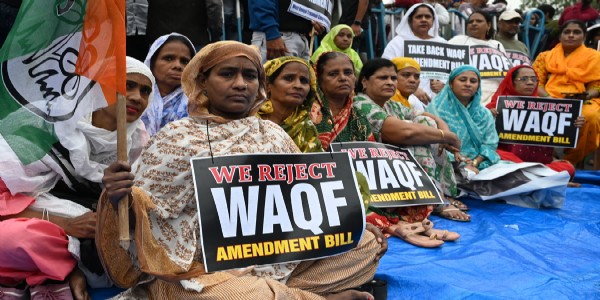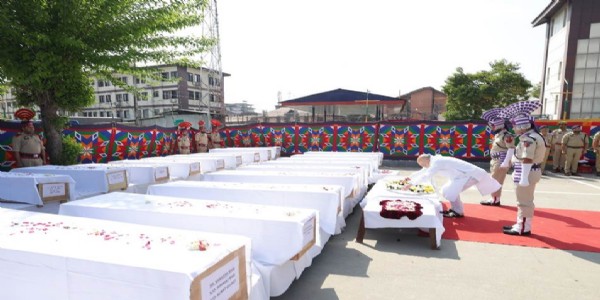Transforming Tribal Education: Need for Trained Teachers in Maharashtra’s Semi-English Ashram Schools
Total Views | 476
The government of Maharashtra with a resolve to make equal opportunities for tribal children, especially those studying in ashram schools, transformed 52 ashram schools into semi-English medium institutions. Even parents supported the decision. Now the schools are facing problems with the textbooks and trained teachers the TOI reported recently.
 May be the procurement of books can be solved, of course, they certainly play a pivotal role in the learning process. Availability of well-trained teachers is the most significant aspect of educating children, it needs concerted efforts. A system is to be developed to equip the serving teachers with information, knowledge and the psychological aspect. The psychological aspect plays a significant role in this transition.
May be the procurement of books can be solved, of course, they certainly play a pivotal role in the learning process. Availability of well-trained teachers is the most significant aspect of educating children, it needs concerted efforts. A system is to be developed to equip the serving teachers with information, knowledge and the psychological aspect. The psychological aspect plays a significant role in this transition.
The teachers who are working in the schools are qualified, but the needs were different then. Now the expectations of parents and government have changed drastically. The available teachers need to be trained to help children in this endeavour. How can they help children in the area where they need some guidance? Even the language of instruction is to be mastered first, classroom teaching. It is not like writing the answers in the examination. It is a live interaction.
Along with the time the method too needs many improvements. Teachers have to comprehend the challenges of the changing needs. They just cannot work with the knowledge once acquired till retirement.
No doubt periodic training programmes are organised,( for the select grade or higher grade they are given some training, but it is not sufficient to help them grasp the new dimensions of the changing scenario ) they have to be in tune with the objectives. They are completed, most of the time for ticking the box. There is no provision for continuous training. Such opportunities arise only twice or thrice in the entire service period.
Especially when such a need arises, it doesn't help teachers, nor does it help children to upgrade. If there is a specific objective like the decision of making the schools semi-english medium schools,it needs special efforts and a special need-based programme designed. The experts need to be selected carefully, they cannot just be senior teachers selected. Administration can select resource people who can effectively understand the need and energetically and successfully impart training.
The teachers in the present situation need not be gathered at a particular place. The use of technology makes the process easy. The administration has equipped almost all the government-run schools with good computer labs, and private institutions to have developed such labs. All can join from the respective schools for the training. It, now need not be a short course. It can run for the required period.
Teachers may be trained in the language as well as in the subject. ( Many universities now offer science subjects in Marathi too. ) At the same time, they need to know the complexity of the picture, the psychological barriers of the children in shifting to a new situation need to be analysed and dealt with. These points are to be carefully included in the training module. Even if teachers face some difficulties, there should be some discussion related to their problems. They too are to be made aware and understand the benefits of change.
Maybe it cannot be discussed in a couple of sessions. Thus such ambitious programmes need a slightly different approach.
At the initial level, the responsibility of teaching may not be transferred to the existing set of teachers. Experienced teachers from the urban or semi-urban areas may be appealed to share the responsibility of conducting the online teaching for some time. Many retired teachers can be of great help. ( A few are already helping honorarily, some agencies give this kind of support to the schools in need. ) The existing teachers can work as helping or co-teachers for some time till they acquire the necessary training and knowledge. This would be a sort of hands-on experience for them, the interaction can include teachers' queries too. The points students want to discuss may be communicated directly or indirectly after the session. This would help build confidence. These classes are to be necessarily interactive where teachers can moderate the discussion or help children raise some points.
The technical setup is to be used effectively, all the teachers should be in the process of continuous training. Small online modules are to be developed by experts in the subjects at all levels. Corporate houses or companies or all types of establishments give opportunities to the staff for continuous upgrades and be aware of the latest trends. The teachers that work with aided and unaided schools too should have such convenience to update. The State Government can design and make it available for the teachers, rather every year teachers need to complete the necessary certifications. It is to be meticulously designed and rigorously implemented. Our education system needs to be fortified by the perpetual phase of upgrade.
Maharashtra has all the necessary human and other resources at its disposal,it can run such pioneering plan and make an example out of it.
At this juncture when out state government wishes to align with the rising aspirations and expectations, careful implementation of the scheme is essential,it would definitely have the desired results.

The teachers who are working in the schools are qualified, but the needs were different then. Now the expectations of parents and government have changed drastically. The available teachers need to be trained to help children in this endeavour. How can they help children in the area where they need some guidance? Even the language of instruction is to be mastered first, classroom teaching. It is not like writing the answers in the examination. It is a live interaction.
Along with the time the method too needs many improvements. Teachers have to comprehend the challenges of the changing needs. They just cannot work with the knowledge once acquired till retirement.
No doubt periodic training programmes are organised,( for the select grade or higher grade they are given some training, but it is not sufficient to help them grasp the new dimensions of the changing scenario ) they have to be in tune with the objectives. They are completed, most of the time for ticking the box. There is no provision for continuous training. Such opportunities arise only twice or thrice in the entire service period.
Especially when such a need arises, it doesn't help teachers, nor does it help children to upgrade. If there is a specific objective like the decision of making the schools semi-english medium schools,it needs special efforts and a special need-based programme designed. The experts need to be selected carefully, they cannot just be senior teachers selected. Administration can select resource people who can effectively understand the need and energetically and successfully impart training.
The teachers in the present situation need not be gathered at a particular place. The use of technology makes the process easy. The administration has equipped almost all the government-run schools with good computer labs, and private institutions to have developed such labs. All can join from the respective schools for the training. It, now need not be a short course. It can run for the required period.
Teachers may be trained in the language as well as in the subject. ( Many universities now offer science subjects in Marathi too. ) At the same time, they need to know the complexity of the picture, the psychological barriers of the children in shifting to a new situation need to be analysed and dealt with. These points are to be carefully included in the training module. Even if teachers face some difficulties, there should be some discussion related to their problems. They too are to be made aware and understand the benefits of change.
Maybe it cannot be discussed in a couple of sessions. Thus such ambitious programmes need a slightly different approach.
At the initial level, the responsibility of teaching may not be transferred to the existing set of teachers. Experienced teachers from the urban or semi-urban areas may be appealed to share the responsibility of conducting the online teaching for some time. Many retired teachers can be of great help. ( A few are already helping honorarily, some agencies give this kind of support to the schools in need. ) The existing teachers can work as helping or co-teachers for some time till they acquire the necessary training and knowledge. This would be a sort of hands-on experience for them, the interaction can include teachers' queries too. The points students want to discuss may be communicated directly or indirectly after the session. This would help build confidence. These classes are to be necessarily interactive where teachers can moderate the discussion or help children raise some points.
The technical setup is to be used effectively, all the teachers should be in the process of continuous training. Small online modules are to be developed by experts in the subjects at all levels. Corporate houses or companies or all types of establishments give opportunities to the staff for continuous upgrades and be aware of the latest trends. The teachers that work with aided and unaided schools too should have such convenience to update. The State Government can design and make it available for the teachers, rather every year teachers need to complete the necessary certifications. It is to be meticulously designed and rigorously implemented. Our education system needs to be fortified by the perpetual phase of upgrade.
Maharashtra has all the necessary human and other resources at its disposal,it can run such pioneering plan and make an example out of it.
At this juncture when out state government wishes to align with the rising aspirations and expectations, careful implementation of the scheme is essential,it would definitely have the desired results.
Bharati Web








